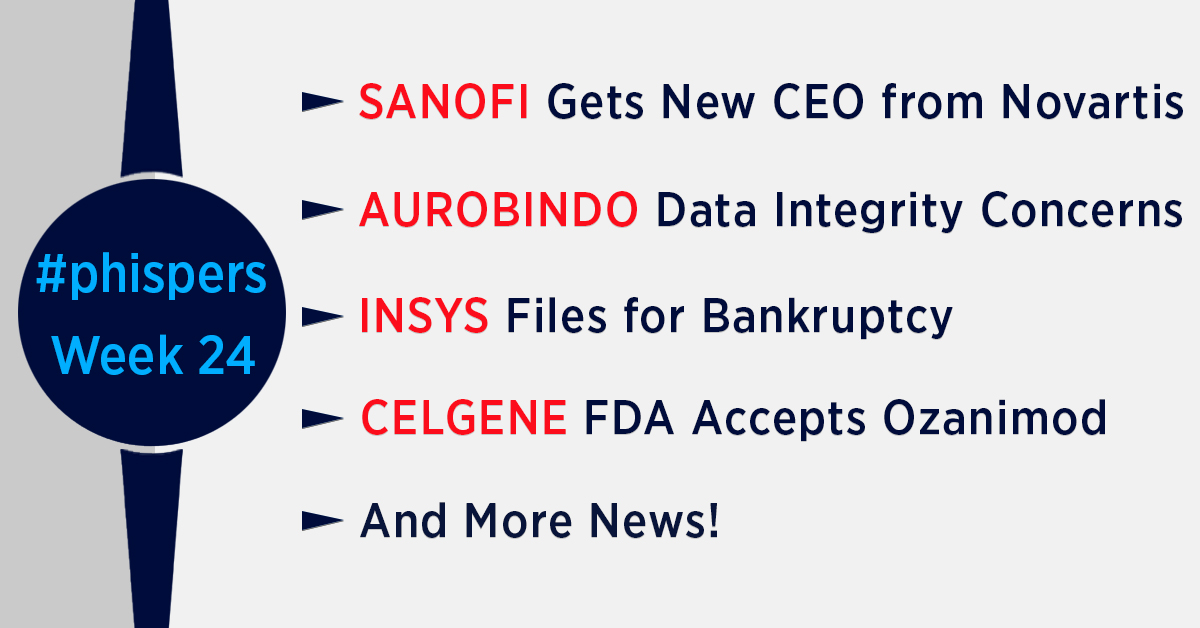
By PharmaCompass
2019-06-13
Impressions: 3005
This week, we report on how Sanofi finally managed to get a successor to CEO Olivier Brandicourt, who is due to retire soon.
Two companies — Insys and Mallinckrodt — settled US Department of Justice cases.
While Insys settled an opioid scam case by shelling out US$ 225 million, Mallinckrodt settled a drug pricing case.
German drugmaker Fresenius told EMA that stricter production norms could exacerbate shortages of piperacillin-tazobactam, a life-saving antibiotic.
FDA accepted Celgene’s once-spurned application for ozanimod, an experimental therapy for multiple sclerosis.
This raises hopes for the success of the US$ 74 billion buyout of Celgene by Bristol-Myers Squibb earlier this year.
Aurobindo Pharma got issued a Form 483 by the FDA yet again, over data integrity issues.
What was worse, bankrupt Aceto Corp filed a case against Aurobindo, accusing it of sabotaging and systemically destroying its business.
And Merck bought yet another biotech — Tilos Therapeutics.
Its blockbuster Keytruda won FDA approval for treatment of head and neck cancer.
Sanofi finds CEO
replacement; poaches Paul Hudson from Novartis
Sanofi will soon have a non-French CEO, as Olivier Brandicourt (63) gets ready to brace retirement. The French drugmaker has poached its CEO from Novartis AG. The company named Paul Hudson, CEO of Novartis Pharmaceuticals, as its new chief.
Hudson is a British pharmaceutical executive with an international pedigree. The 51-year-old executive will take over in September from Brandicourt. His recruitment is likely to help Sanofi bolster its pipeline of medicines and deal with growing pressure on drug prices in the US.
Novartis CEO Vas Narasimhan congratulated Hudson and named Marie-France Tschudin, a Swiss citizen who’s heading cancer group Advanced Accelerator Applications (which was acquired by Novartis in 2017), as Hudson’s replacement.
Hudson had joined Novartis three years ago, after serving as the US pharma chief for AstraZeneca. As the CEO of Sanofi, Hudson will have to take on several challenges facing the drugmaker, such as its slow moving R&D team, and probes into its diabetes drugs. In the US, insulin makers such as Sanofi, Eli Lilly and Novo Nordisk have been facing investigations over rising insulin prices.
In 2018, Brandicourt faced a 25 percent pay cut as the company suffered major sales declines in its flagship diabetes unit. Even though Sanofi has executed major alliances with Regeneron and Alnylam on groundbreaking drugs, the company is perceived as sluggish, taking a long while to execute M&As under Brandicourt that have led to some frustrating misses in the past.
Hudson will also have his hands full trying to turn around Sanofi’s cholesterol therapy Praluent (alirocumab), whose sales have been plummeting.
Data-integrity concerns surface at Aurobindo Pharma’s India unit
The US Food and Drug Administration (FDA) posted a Form 483 issued to Indian drugmaker Aurobindo Pharma after an inspection of the firm’s Unit 3 operations in Hyderabad last month. The 10-day inspection revealed data-integrity concerns as the FDA investigator observed “uncontrolled, loose, handwritten notebooks with what appears to be laboratory test data results”.
Additional data integrity concerns were also raised over electronic raw laboratory data. In many cases, samples were injected into chromatography equipment and were not run completely as per the method requirements.
The firm disregarded the data and labeled it as “incomplete data”, as it didn’t comply with the procedure that had to be followed. When the FDA dug deeper, it found multiple cases where such “incomplete data” was available for evaluation to determine whether the product was in specification or not.
In another case, when the FDA investigator reviewed electronic laboratory records of retained samples and compared them with the actual sample weights available, there was a significant mismatch of results.
The FDA investigator also witnessed an equipment cleaning operation that took significantly longer in the presence of the FDA official, as against all entries made in the logbook since the beginning of the year. During the cleaning, the FDA raised concerns over the methods being followed as some procedures were not documented and in another case operators claimed to have conducted a step which was actually not being undertaken.
As in the case of other inspections, the FDA also had issues with investigations and handling of customer complaints.
Bankrupt
Aceto files
case against Aurobindo, accusing it of sabotage
Back in February, Aceto Corporation had filed for bankruptcy, and we had reported on how Aceto Corporation had entered into a “stalking-horse” asset purchase agreement (an attempt by a bankrupt company to test the market for its assets) with an affiliate of New Mountain Capital to sell its chemicals business assets, under the US Bankruptcy Code.
Now, the bankrupt company has filed a case against Indian drugmaker Aurobindo Pharma, accusing the company and its founder PV Ramprasad Reddy of sabotaging and systemically destroying the company’s business.
In a case filed in a New Jersey district court, Aceto sought damages from Aurobindo on charges of fraud, negligent misrepresentation, breach of contract, breach of duty of good faith and fair dealing.
“This action arises out of Aurobindo’s calculated and systematic scheme to destroy Aceto’s generic pharmaceutical business operated through Rising Pharmaceuticals, which ultimately worked,” Aceto wrote in its petition. Aurobindo has denied these allegations.
Aceto had signed a definitive product purchase agreement to acquire generic products and related assets of Citron Pharma and Lucid Pharma for approximately US$ 412 million in 2016. Citron and Lucid were two companies for which Aurobindo was manufacturing drugs.
The acquisitions were made through Rising Pharmaceuticals, an Aceto subsidiary.
Subsequently, the company suffered losses. According to Aceto, the losses were triggered by Aurobindo’s deliberate attempts to sabotage its business.
Aceto also alleged that Reddy’s wife in the US had a large stake in Citron. Once its assets had been sold, she sold her shares in the company. Post that, Aurobindo had no further interest in seeing Aceto succeed.
Aurobindo dismissed the allegations saying they were “devoid of merits and consists of baseless allegations of fraud, negligent misrepresentation and the failure to fulfil its obligations”.
Insys
settles opioid case, files for bankruptcy; Mallinckrodt settles drug pricing
case
Last month, PharmaCompass had carried a report on billionaire John Kapoor, founder of Insys Therapeutics, being convicted by a federal jury in Boston. He, along with four of his senior colleagues, had engaged in a bribery scheme to get doctors to prescribe its potent and addictive opioid painkiller — Subsys. A federal jury in Boston had also charged them with duping insurers into paying for the drug.
Last week, there was news that Insys has decided to settle the fraud probes by agreeing to pay US$ 225 million. Moreover, an operating unit (named Insys Pharma) will plead guilty to fraud to settle probes into the payment of kickbacks to induce doctors to prescribe highly addictive opioids, the US Department of Justice (DOJ) said.
Subsys is an under-the-tongue spray meant to treat pain in adult cancer patients. It contains fentanyl, an opioid 100 times stronger than morphine.
Insys will pay a US$ 2 million fine, forfeit US$ 28 million, and pay US$ 195 million to settle charges it defrauded the government under the False Claims Act.
“For years, Insys engaged in prolonged, illegal conduct that prioritized its profits over the health of the thousands of patients who relied on it,” US Attorney Andrew Lelling in Massachusetts said. “Today, the company is being held responsible.”
In one instance, the company paid nearly US$ 260,000 to two New York doctors who wrote more than US$ 6 million worth of Subsys prescriptions in 2014.
After this US$ 225 million settlement, Insys filed for bankruptcy. It will sell off its assets post the settlement with DOJ.
Another drugmaker who decided to settle a DOJ probe was Mallinckrodt Plc. The company said it had tentatively agreed to pay US$ 15.4 million to resolve the DOJ probe into how a drugmaker it had bought over marketed an expensive treatment for a rare infant seizure disorder and multiple sclerosis.
The DOJ also alleged that from 2010 to 2014 the drugmaker used a patient assistance charity as a conduit to improperly subsidize Medicare patients’ copayment obligations, allowing the company to keep raising prices for the drug — HP Acthar Gel. Mallinckrodt said it will fight this new claim by the department.
In March, the department joined a pair of whistleblower lawsuits that alleged Questcor Pharmaceuticals, which Mallinckrodt had acquired in 2014, defrauded government healthcare programs by illegally marketing Acthar.
The DOJ said the price of the drug had spiked in the years since Questcor acquired it in 2001 from about US$ 50 per vial to US$ 32,200 in 2014. Mallinckrodt said the drug’s price today is US$ 38,892 per vial. Last year, Acthar represented 35 percent of Mallinckrodt’s US$ 3.2 billion sales.
Fresenius
says tighter EU rules could trigger antibiotic shortage
German drugmaker Fresenius has sent out a warning to the European drug regulator that stricter production norms being considered by it could exacerbate shortages of a life-saving antibiotic — piperacillin-tazobactam — that is used by about 25 million patients globally each year.
Piperacillin, given in combination with efficiency-booster tazobactam, is a broad-spectrum antibiotic used to combat serious infections such as sepsis or pneumonia.
The market for piperacillin-tazobactam is highly concentrated with Fresenius and Chinese rival Qilu supplying almost the entire European market between them. Production outages at Qilu have resulted in repeated stock shortages over the past three years.
The European Medicines Agency (EMA) is working on a revision of good manufacturing practices (GMP) that govern the production of sterile drugs such as infusions and injections to take into account the latest technology developments.
Though the GMP review is an important initiative, piperacillin shortages should be avoided because second-choice drugs would put patients’ lives at risk from avoidable infections, Marc-Alexander Mahl, in charge of generic drugs and complex formulations at the Kabi division of Fresenius, said.
FDA accepts Celgene’s ozanimod
application; Lilly’s cluster headache drug gets nod
The US Food and Drug Administration (FDA) has accepted Celgene’s once rejected application for ozanimod, an experimental therapy for multiple sclerosis. Fifteen months ago, FDA’s refuse-to-file on the ozanimod application had triggered a collapse of faith in Celgene.
In fact, Celgene reported that both the FDA as well as the EMA have accepted the application for ozanimod. Though the acceptance does in no way guarantee approval, it does set the clock ticking on a major regulatory decision that is central to the success of the US$ 74 billion Celgene buyout by Bristol-Myers Squibb (BMS). In January, BMS acquired Celgene for around US$ 74 billion.
The EMA decision (on approval of ozanimod) will come in the first half of 2020. The FDA is also likely to decide on the drug by March 25, 2020 (which marks the PDUFA deadline for the US regulator to review new drugs).
Meanwhile, in a high-level reorganization, BMS has retrenched its chief scientific officer (CSO) Tom Lynch, who was brought in just two years back. The company said Lynch will leave his post as
CSO in four months. Celgene’s R&D executive Rupert Vessey will move into his position. Novartis’ oncology development head Samit Hirawat will join BMS as chief medical officer.
Lilly’s headache drug: Eli Lilly’s migraine treatment Emgality became the first drug to gain FDA approval for decreasing the frequency of episodic cluster headache attacks.
Emgality belongs to a new class of drugs called CGRP inhibitors, used to prevent migraines or reduce their frequency. It competes with Ajovy from Teva and Amgen’s Aimovig.
Cluster headaches are recurring, intense headaches that can occur several times daily during a “cluster period.” Lilly estimates that around 250,000 people suffer from the condition in the United States.
Merck
buys another biotech; Keytruda wins FDA nod for head, neck cancer
Last month, a day before its IPO, Merck had announced it has purchased Peloton Therapeutics for US$ 2.2 billion in cash and additional payments. And this week, there is news that Merck has struck a US$ 773 million deal to buy Tilos Therapeutics. The takeover will give Merck control over a pipeline of cancer, fibrosis and autoimmune programs targeting the latent TGFβ complex (a multifunctional signaling molecule that plays a role in a wide array of cellular processes).
“Tilos has developed a compelling portfolio of candidates that employ a novel approach to modulating the potent signaling molecule TGFβ by binding to latency-associated peptide, with potential applications across a range of disease indications,” Dean Li, senior vice president at Merck, said in a statement.
While both these deals add intriguing assets that bolster Merck’s pipeline, they don’t address Merck’s over-reliance on the immune-boosting cancer blockbuster Keytruda.
That said, Keytruda’s future looks bright, as the blockbuster won FDA approval to treat head and neck cancer. Keytruda, a type of immunotherapy called a PD-1 inhibitor, is already an approved treatment for several forms of cancer, including lung and skin cancers. Keytruda brought in revenue of US$ 7.17 billion for Merck in 2018.
According to Merck, Keytruda has been approved for use as a monotherapy, as well as in combination with chemotherapy, to treat previously untreated patients with head and neck squamous cell carcinoma.
The approval is based on results from a late-stage trial, where Keytruda showed a significant improvement in overall survival in cancer patients.
Head and neck cancer includes tumors in the mouth, tongue, nose, sinuses, throat and lymph nodes in the neck. Merck estimates that there will be more than 65,000 new cases of head and neck cancer diagnosed in 2019 in the United States.
The PharmaCompass Newsletter – Sign Up, Stay Ahead
Feedback, help us to improve. Click here
Image Credit : #Phisper Infographic by SCORR MARKETING & PharmaCompass is licensed under CC BY 2.0
“ The article is based on the information available in public and which the author believes to be true. The author is not disseminating any information, which the author believes or knows, is confidential or in conflict with the privacy of any person. The views expressed or information supplied through this article is mere opinion and observation of the author. The author does not intend to defame, insult or, cause loss or damage to anyone, in any manner, through this article.”






